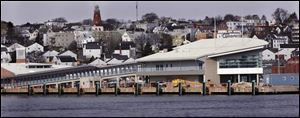
Rule may sink revenue at U.S. ports
3/3/2008
A $21 million cruise ship terminal is to open in spring in Portland, Maine. A second berth for large ships is to open next year.
PORTLAND, Maine - Portland's $21 million terminal for cruise ships and ferries will open this spring. Another $7 million berth built to accommodate the world's largest cruise ships will follow next year.
There's one problem. Because of a proposed change in federal rules, the city banking on cruise ships and passengers to pump millions of dollars into its economy is wondering how many, if any, cruise ships will call this summer.
U.S. Customs and Border Protection wants to require foreign-flagged cruise ships that depart from a U.S. port to spend 48 hours in a foreign port. It also would require them to spend more than 24 hours in a foreign port for every two days in a U.S. port. More time in foreign ports would mean less in U.S. ports, and fewer tourists to spill out of the ships and spend money in places like Portland.
"It could be potentially devastating. There's no question about that," said Jeff Monroe, the city's transportation director.
The proposed change is aimed at helping U.S.-flagged cruise ships based in Hawaii compete against foreign cruise ships sailing from California by cutting the foreign ships' time in the islands. It would close a loophole that allowed foreign-flagged ships to sail from U.S. ports to Hawaii by stopping briefly in Mexico on the way.
Critics say the change will imperil hundreds of millions of dollars in revenues and port improvements on the mainland United States.
In Portland, Mr. Monroe predicts up to 80 percent of cruise ships would have to alter itineraries, and they might drop Bar Harbor and Portland from their summer and fall cruises.
The two ports accounted for 120 cruise ship stops last year. More than 150,000 tourists disembarked from the ships, spending money in shops, dining in restaurants, and taking shore excursions.
Other U.S. ports, such as Key West, Fla., also would be affected by the rules. Key West could get skipped altogether by cruise ships traveling from Florida's mainland to the Caribbean.